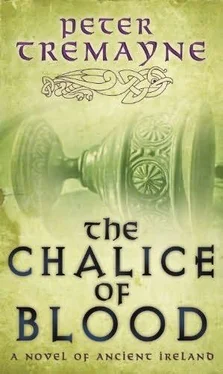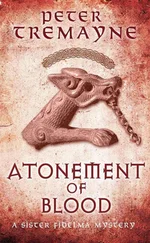Peter Tremayne - Chalice of Blood
Здесь есть возможность читать онлайн «Peter Tremayne - Chalice of Blood» весь текст электронной книги совершенно бесплатно (целиком полную версию без сокращений). В некоторых случаях можно слушать аудио, скачать через торрент в формате fb2 и присутствует краткое содержание. Жанр: Исторический детектив, на английском языке. Описание произведения, (предисловие) а так же отзывы посетителей доступны на портале библиотеки ЛибКат.
- Название:Chalice of Blood
- Автор:
- Жанр:
- Год:неизвестен
- ISBN:нет данных
- Рейтинг книги:5 / 5. Голосов: 1
-
Избранное:Добавить в избранное
- Отзывы:
-
Ваша оценка:
- 100
- 1
- 2
- 3
- 4
- 5
Chalice of Blood: краткое содержание, описание и аннотация
Предлагаем к чтению аннотацию, описание, краткое содержание или предисловие (зависит от того, что написал сам автор книги «Chalice of Blood»). Если вы не нашли необходимую информацию о книге — напишите в комментариях, мы постараемся отыскать её.
Chalice of Blood — читать онлайн бесплатно полную книгу (весь текст) целиком
Ниже представлен текст книги, разбитый по страницам. Система сохранения места последней прочитанной страницы, позволяет с удобством читать онлайн бесплатно книгу «Chalice of Blood», без необходимости каждый раз заново искать на чём Вы остановились. Поставьте закладку, и сможете в любой момент перейти на страницу, на которой закончили чтение.
Интервал:
Закладка:
Eadulf had noticed that Brother Lugna used the Latin term refectorium instead of praintech , the usual word for an eating house. Eadulf had noticed that in many abbeys Latin terms were replacing native words for functions and places — the use of the Latin cubiculum for chamber instead of the usual cotultech ; of scriptor for librarian and scriptorium for library in place of leabhar coimedach , keeper of books, and tech-screptra , library. It seemed that the abbey of Lios Mór, too, was changing. Perhaps Brother Lugna’s Roman tonsure was more significant than he had previously thought.
It was a short time later when Brother Máel Eoin came to show him and Fidelma the way to the refectorium . At the doors of the refectorium they found Gormán about to enter.
‘Are you being looked after well?’ Fidelma greeted the young warrior.
‘I have a good bed, lady,’ he replied with a brief smile. ‘I am quartered above the stables with the echaire , the stableman. I have been looking around at the new buildings. It seems the abbey is growing rapidly since last I came here. A chapel in stone and two other buildings already completed. The abbey appears to have come into great wealth.’
He was interrupted by a gesture from Brother Eoin as he opened the doors and showed them into the great hall where the community was eating. He steered them through the rows of long tables to a table set to one side of the refectorium . Many of the brethren raised their heads to observe their passage with undisguised curiosity. A low murmur arose from them. Fidelma noticed that there were few women in the hall, although there were some. Lios Mór had, she recalled, initially been a conhospitae , a mixed house, where men and women cohabited, raising their children to the service of the new religion. She remembered the story of how Carthach had come to Lios Mór with Flandait, the daughter of Cuanan, and several other women to help form the community. They found a holy woman named Caimel already living by the river. Caimel had become the head of the community of women at Lios Mór. She wondered whether Abbot Iarnla was gradually leading the religious community towards celibacy, for there was little evidence of women being co-equal as they had been when she last visited.
The fact that there were few women in the hall had also occurred to Eadulf. He had also noticed that the women who were present had been placed at the lower end of the refectorium . The abbot’s table was at the far end on a raised platform and here Abbot Iarnla, his steward and several others were seated at their meal. Eadulf presumed that the abbot’s table was filled with the hierarchy of the abbey and they were all male. Then he realised that Brother Eoin was leading them to a table to one side of the hall. Eadulf knew from experience that Fidelma, as sister to the King was usually seated as a distinguished guest. He saw that Fidelma gave no sign that she was insulted by what seemed a breach of natural courtesy. One or two of the brethren bowed their heads towards them in obvious recognition as they passed between the tables.
At the table to which they were guided they found two other guests, who introduced themselves. Glassán was a man of middle age, with even features, bright blue eyes and wiry brown hair, and a firm chin with a cleft jaw. He looked used to being outside in the elements and his clothing did not hide his well-muscled body. He seemed to assume a natural command over his companion who was introduced as Saor. He was thin and sinewy, a swarthy fellow with close-set eyes.
‘Are you guests in the abbey?’ Fidelma asked as they seated themselves. She was interested by their appearance, for neither seemed like men who would choose life in an abbey.
‘That we are,’ replied Glassán with a broad smile that was almost patronising. ‘Fairly permanent and important ones.’
‘Permanent and important?’ Gormán’s query seemed to be without irony, but his eyes were glinting. ‘What manner of men are you who honour us with your company?’
‘I am an ailtíre ,’ the brawny Glassán declared without any modesty. ‘Saor, here, is my carpenter and assistant.’
‘Ah, you are a … a master builder?’ Eadulf tried to translate the technical office.
‘I am in charge of the rebuilding of the abbey,’ confirmed Glassán. Clearly he was not a man who believed in humility.
‘We saw that there had been changes,’ Gormán replied. ‘A lot of new stone buildings have appeared where I remember buildings of wood.’
‘Quite right, my young friend,’ agreed Glassán. ‘For three years now the abbey has employed me to oversee the new building work.’
‘That must be an enormous task,’ Eadulf commented. He was genuinely interested.
‘I have several men working under me, including some of the finest caisleóir , stonemasons, of the south.’
‘The abbey must be rich to engage in such rebuilding,’ observed Gormán.
The master builder grimaced. ‘That you would have to ask Brother Lugna. For my part, each fee for services is specified by the Law of the Fénechus, as is compensation for craftsmen injured in the pursuit of their work.’
Eadulf looked surprised and Fidelma explained. ‘A master builder is considered on the same level as the intended successor to a bo-aire , which would mean his honour price is worth twenty seds — the value of twenty milch cows.’
Glassán was looking at Fidelma with interest.
‘You know something of the law, Sister?’ Then he smiled. ‘Ah, of course. You are the dálaigh that the brethren here have been talking about. Someone who is going to make a report about the cleric who died.’
‘Did you know him?’
‘Know him? We are too busy to socialise with the brethren here, even if they were sociable.’ He grinned at his quip. No one laughed.
‘Twenty seds is a large sum, indeed,’ observed Eadulf, filling the awkward silence.
‘Small compensation for the many years of study and apprenticeship, as in all arts and crafts,’ pointed out Glassán in an almost defensive manner. ‘There is a lot of responsibility in superintending the construction of these buildings, and one has to be a master in many different things, stonemasonry, carpentry …’ He suddenly shot a condescending look at his quiet companion. ‘Thankfully, Saor here takes many onerous tasks from my shoulders. He is my chief assistant.’
‘But if you are building in stone, surely you need stonemasons rather than carpenters,’ queried Gormán.
Saor’s chin came up defensively and he spoke for the first time. ‘Even with stone work, wooden frames must be made and carpentry must be employed,’ he announced with a tone of annoyance.
‘Of course.’ Glassán smiled, regaining the conversation. It was clear that he was enthusiastic about his craft and not loath to expand on the problems and skill that faced him and the rest of his team of workmen. As master builder, Glassán was provided with accommodation in the guesthouse, while his assistant and his workmen lived outside the abbey, along the river bank, in a collection of huts they had erected for the purpose. For the rest of the meal he continued to talk of the problems of replacing some of the wooden structures of the abbey with buildings of stone. He had a habit of talking in a low droning tone, almost without stopping, so that there was little dialogue.
Gormán’s expression quickly took on a slightly glazed look, as if he had shut off his mind from Glassán’s interminable details and technical explanations. Throughout, the thin-faced Saor, sat in almost moody silence, apart from one or two muttered comments. At the end of the meal, Fidelma and Eadulf rose hurriedly, thankful to be able to escape.
Читать дальшеИнтервал:
Закладка:
Похожие книги на «Chalice of Blood»
Представляем Вашему вниманию похожие книги на «Chalice of Blood» списком для выбора. Мы отобрали схожую по названию и смыслу литературу в надежде предоставить читателям больше вариантов отыскать новые, интересные, ещё непрочитанные произведения.
Обсуждение, отзывы о книге «Chalice of Blood» и просто собственные мнения читателей. Оставьте ваши комментарии, напишите, что Вы думаете о произведении, его смысле или главных героях. Укажите что конкретно понравилось, а что нет, и почему Вы так считаете.











